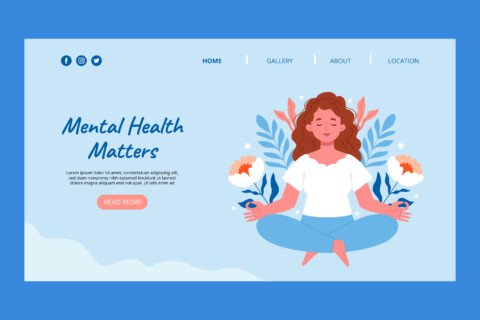Introduction
Mental health in fitness is the cornerstone of achieving a balanced, sustainable wellness journey. While physical strength and nutrition are vital, your mindset often determines success more than any workout or meal plan. Many face mental barriers like self-doubt, anxiety, or lack of motivation, which can feel more daunting than a marathon. In 2025, prioritizing mental health in fitness empowers you to overcome these challenges, build resilience, and create a fulfilling lifestyle. This guide offers practical, inclusive strategies to integrate mental and physical wellness for lasting results.
Understanding the Importance of Mental Health in Fitness
Fitness is as much a mental endeavor as a physical one. Mental health in fitness influences your ability to stay motivated, consistent, and resilient. Common mental barriers include:
-
Negative self-talk about your body or abilities.
-
Anxiety about starting a new routine or entering a gym.
-
Fear of failure or not meeting lofty fitness goals.
-
Emotional stress disrupting healthy eating or exercise habits.
By addressing these challenges, a focus on mental health in fitness creates a foundation for sustainable progress, ensuring your journey is both empowering and inclusive.
Why Prioritizing Mental Health in Fitness Matters
Focusing on mental health in fitness goes beyond physical gains—it nurtures your mind, emotions, and body holistically. Unlike restrictive diets or intense regimens, this approach fosters long-term wellness. Benefits include:
-
Enhanced Motivation: A positive mindset drives consistency in workouts and nutrition.
-
Boosted Confidence: Small achievements build self-esteem across your journey.
-
Reduced Anxiety: Mindfulness eases stress related to fitness or body image.
-
Joyful Exercise: Movement becomes a source of joy, not obligation.
-
Emotional Resilience: Coping tools help you navigate setbacks with grace.
This holistic focus ensures fitness is accessible and sustainable for everyone, regardless of their starting point or background.
Key Strategies for Mental Health in Fitness

To succeed, integrate mental and physical wellness through these core strategies, each designed to support a holistic fitness journey.
1. Building a Positive Mindset for Fitness
A strong mindset is essential for mental health in fitness. Negative thoughts, like “I’m not good enough,” can derail progress. To cultivate positivity:
-
Practice Positive Self-Talk: Replace criticism with encouragement, e.g., “I’m proud of my effort today.”
-
Celebrate Small Wins: Acknowledge achievements, like completing a workout or eating mindfully.
-
Visualize Success: Picture yourself thriving in your routine to boost motivation.
-
Reframe Challenges: View setbacks as opportunities to grow, not failures.
Positive self-talk creates a cycle of mental and physical progress, reinforcing your commitment.
2. Managing Anxiety in Fitness
Anxiety about fitness—whether about gym environments or body image—is common. Address it through:
-
Mindfulness Techniques: Meditation or deep breathing reduces stress before workouts.
-
Gradual Steps: Start with low-pressure activities, like a short walk, to build confidence.
-
Inclusive Spaces: Choose gyms or classes that feel welcoming to all.
-
Professional Support: Work with a therapist to tackle anxiety triggers.
These strategies make fitness feel approachable, enhancing mental health in fitness.
3. Setting Realistic Goals for Mental Fitness
Unrealistic goals can overwhelm and discourage. A focus on mental health in fitness emphasizes:
-
Attainable Targets: Set small goals, like exercising twice weekly or adding a vegetable to meals.
-
Personalized Plans: Tailor goals to your current abilities, not others’ achievements.
-
Inclusivity: Ensure goals reflect your unique needs, lifestyle, and identity.
-
Track Progress: Use a journal or app to celebrate milestones, boosting motivation.
Realistic goals foster confidence and sustain mental fitness.
4. Creating a Supportive Fitness Community
A supportive community enhances mental health in fitness. Build connections by:
-
Finding Accountability Partners: Exercise with friends or join group classes.
-
Engaging with Role Models: Connect with individuals who inspire without comparison.
-
Joining Communities: Participate in online or in-person fitness groups that foster encouragement.
-
Seeking Professional Guidance: Work with trainers or dietitians who prioritize mental wellness.
A strong network reduces isolation and reinforces your fitness goals.
5. Embracing Joyful Movement for Mental Wellness
Exercise should uplift, not drain. Prioritize joyful movement to support mental health in fitness:
-
Explore Variety: Try yoga, dancing, hiking, or swimming to find what you love.
-
Focus on Mind-Body Connection: Practices like pilates enhance mental clarity and strength.
-
Stay Flexible: Choose workouts that fit your energy and schedule.
-
Avoid Punishment: Exercise for joy, not to “burn off” calories.
Joyful movement sustains long-term fitness and mental well-being.
Practical Steps to Boost Mental Health in Fitness
Ready to start? These actionable steps integrate mental health into your fitness journey.
Step 1: Start Small for Mental Fitness
Begin with manageable changes to build momentum:
-
Commit to 10-minute workouts, like stretching or walking.
-
Add one nutritious food, like fruit, to your meals.
-
Set a goal to hydrate consistently throughout the day.
-
Track small wins in a journal to reinforce motivation.
Small steps create a positive cycle for mental health in fitness.
Step 2: Seek Professional Support for Fitness Wellness
Professionals provide tailored guidance:
-
Trainers: Collaborate with certified trainers who prioritize mental health.
-
Dietitians: Develop balanced, non-restrictive meal plans.
-
Therapists: Address anxiety, self-doubt, or emotional barriers.
-
Coaches: Find mentors, like those at Total Health and Fitness, for holistic support.
Professional guidance ensures your plan is sustainable and inclusive.
Step 3: Create a Positive Fitness Environment
Your surroundings impact mental health in fitness. Optimize them by:
-
Choosing inclusive gyms or virtual classes that feel safe.
-
Curating social media to follow positive, recovery-focused accounts.
-
Setting up a home workout space with uplifting elements, like music.
-
Spending time outdoors to boost mood and reduce stress.
A supportive environment enhances motivation and emotional wellness.
Step 4: Practice Self-Compassion in Fitness
Fitness is a journey, not a destination. Practice self-compassion by:
-
Valuing effort over perfection, e.g., “Showing up is enough.”
-
Forgiving setbacks and focusing on progress.
-
Using affirmations, like “I’m capable of growth.”
-
Taking rest days to honor your body’s needs.
Self-compassion strengthens mental health in fitness, fostering resilience.
Step 5: Use Tools to Support Fitness Mental Wellness
Investing in tools reduces anxiety and boosts confidence:
-
Workout Gear: Comfortable clothing or equipment enhances enjoyment.
-
Tracking Apps: Monitor fitness, nutrition, or mood progress.
-
Meal Planning Resources: Use dietitian-guided plans for simplicity.
-
Assessments: Start with a body composition analysis to set a baseline.
At Total Health and Fitness, we provide tools like personalized plans and equipment to support your journey.
Overcoming Mental Barriers in Fitness
Mental health in fitness involves navigating common challenges. Here’s how to address them.
Barrier 1: Negative Self-Talk
Negative thoughts sabotage motivation. Counter them by:
-
Practicing daily affirmations to build confidence.
-
Challenging criticism with evidence of progress.
-
Seeking therapy to reframe harmful thought patterns.
Barrier 2: Fear of Judgment
Anxiety about being judged in fitness spaces is common. Address it by:
-
Choosing inclusive, welcoming gyms or classes.
-
Exercising with a supportive friend or group.
-
Focusing on your goals, not others’ opinions.
Barrier 3: Lack of Motivation
Motivation fluctuates. Sustain it by:
-
Setting micro-goals to maintain momentum.
-
Pairing workouts with enjoyable activities, like music or podcasts.
-
Connecting with a fitness community for encouragement.
Barrier 4: Setbacks and Burnout
Setbacks are normal. Respond by:
-
Reflecting on triggers without self-blame.
-
Adjusting goals to match your current capacity.
-
Taking breaks to prevent burnout and recharge.
Total Health and Fitness: Your Partner in Mental Fitness
At Total Health and Fitness in Utah, we prioritize mental health in fitness. Our team offers:
-
Personalized Coaching: Work with trainers and dietitians for tailored plans.
-
Comprehensive Assessments: Start with a body composition analysis to set goals.
-
Supportive Community: Join workshops or group sessions to connect.
-
Holistic Guidance: Integrate mental, emotional, and physical strategies.
We’re committed to empowering you with the tools and support for lasting wellness.
Inclusive Fitness for All
Mental health in fitness is inclusive, recognizing that everyone’s journey is unique. Factors like gender, culture, age, or ability shape your experience. To ensure inclusivity:
-
Seek trainers who understand your cultural or personal context.
-
Advocate for accessible fitness spaces or virtual options.
-
Connect with diverse communities to feel supported.
Everyone deserves a fitness journey that honors their identity and needs.
Long-Term Benefits of Prioritizing Mental Health in Fitness
Focusing on mental health in fitness yields lasting rewards:
-
Increased Confidence: Small wins boost self-esteem in and out of the gym.
-
Enhanced Mental Clarity: Reduced stress improves focus and decision-making.
-
Physical Vitality: Balanced fitness enhances energy and strength.
-
Emotional Balance: Coping strategies foster resilience and joy.
These benefits create a ripple effect, enriching every aspect of your life.
Conclusion
A focus on mental health in fitness empowers you to overcome barriers, build resilience, and achieve sustainable wellness. By integrating positive mindsets, joyful movement, supportive communities, and professional guidance, you can create a fulfilling fitness journey. Start small, be kind to yourself, and let Total Health and Fitness guide you toward a healthier, happier you in 2025.



